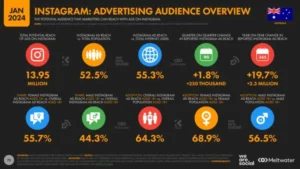
Small businesses start with an emphasis on acquiring the first customers for their business through traditional advertising or maybe even outdoor advertising. This strategy could trickle in business but there is an easier, better way. They need to consider the global online market and use digital marketing to leverage all benefits to grow their business.
Digital marketing for small business is a game-changer. It allows to reach their audience in an effective manner, while personalising their communication and competing in a balanced manner with larger enterprises. This blog will detail the strategies that small businesses can utilise to amplify their growth in today’s competition.
The Digital Marketing Landscape
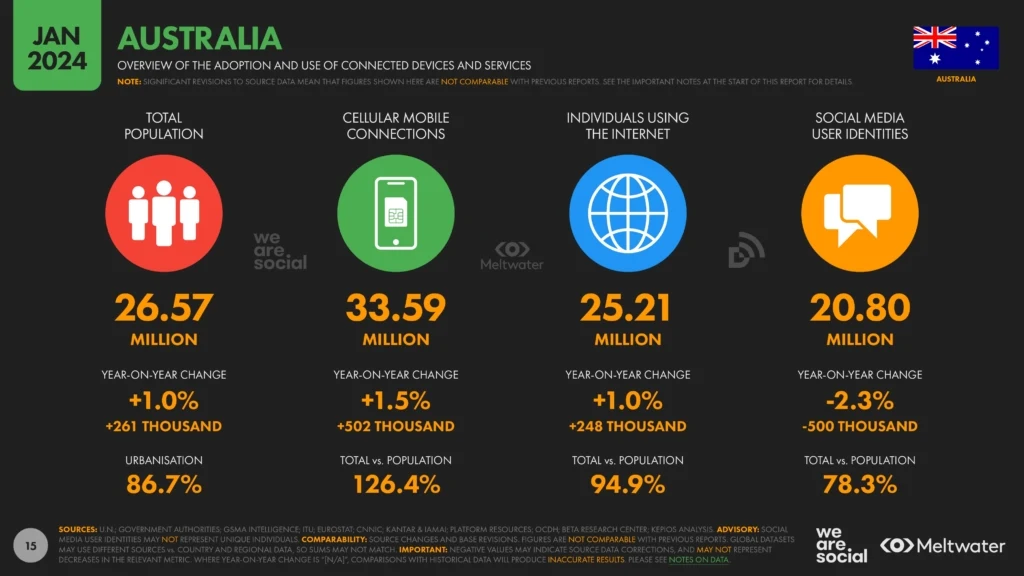
Digital marketing is one of the widely popular and dynamic method to build awareness, interest and sales for small businesses. You need to understand which digital marketing strategy will give optimum results for your small business.
There is a vital growth in Australia’s digital importance. 25.21 million internet users comprising 95% of the population are digitally active. 20.80 million social media identities or 86.5% of adults spend 6 hours and 14 minutes are online each day.
Digital marketing is defined as the use of digital technologies and platforms to promote concepts, products or services to prospective clients. It covers diverse marketing techniques that focus on growing brand awareness, direct website traffic, generate leads and increase customer conversion rates.
How to do digital marketing for small businesses?
There are seven types of digital marketing that have the potential to connect customers with small businesses through different channels.
- Search Engine Optimisation
- Content marketing
- Email marketing
- Pay-per-click advertising
- Social media marketing
- Influencer marketing and Affiliate marketing
- Mobile marketing
- Video marketing
The role of digital marketing is vital in today’s businesses to reach a global audience, engage with customers in real-time with personalised marketing efforts. You can gain brand visibility, drive online sales, and provide measurable results.
Challenges Faced by Australia’s Small Businesses
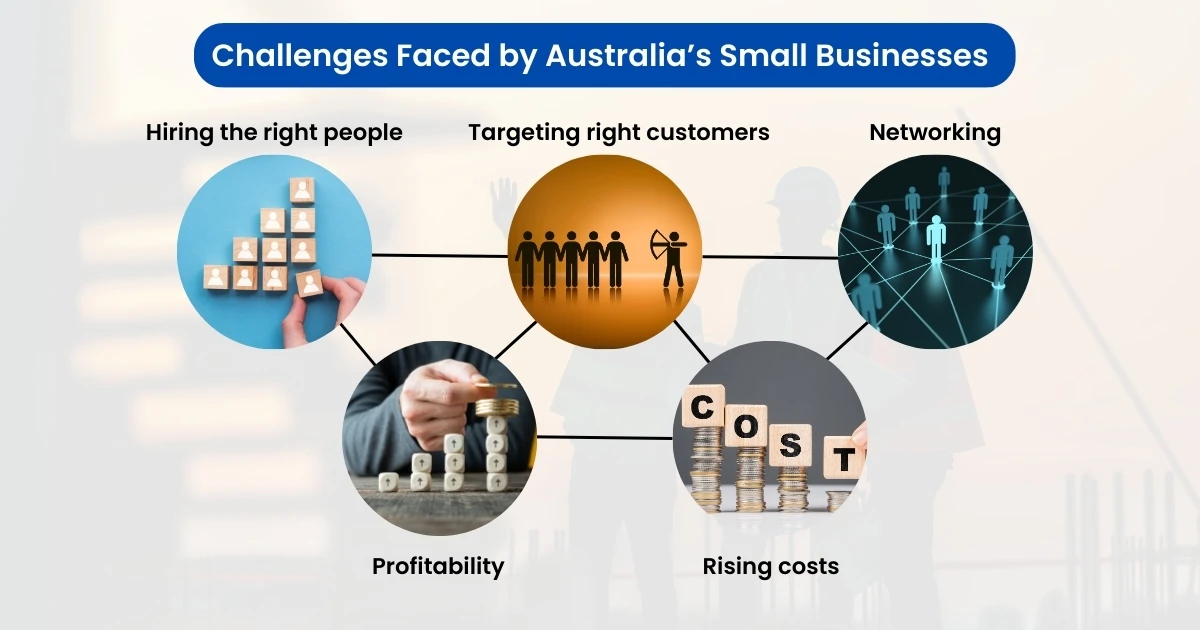
Initiating a small business from an idea or passion is an Aussie dream. A small business owner is extremely challenging, with lot of hard work and sacrifice. An estimated 60% of Australian businesses shut down in their initial three years.
Some challenges that small businesses deal with are discussed here:
Hiring the right people – When a small business hires the wrong people, it can break the business. It can be detrimental and potentially affect operational inefficiencies, a toxic work atmosphere and even lead to business failure.
Targeting right customers – The primary goal of a business is to acquire customers and benefit from it. It is easy to put a wide net to get customers, but the biggest challenge is to target the right customers who are loyal to your business.
Networking – Small business owners spend their time to keep the business up and running. But they forget that it is crucial to work on networking and build connections for their business growth.
Profitability – Transitioning from a start-up to a profitable business is difficult, especially for sole proprietors and very small businesses. This is especially true in competitive industries. 49% of SMBs are struggling with budget management in businesses. One suggestion is to look at digital innovation to help you achieve profitability.
Rising costs – This aspect is a huge challenge for the Australian small business owners. The Zeller Small Business Resilience report reveals that small business owners are highly concerned for the rising costs. They are worried that their costs have increased at a rate much greater than inflation.
While the journey of the small business is with challenges, the right marketing solution can benefit the business and establish them.
Digital Marketing Solutions for Small Businesses
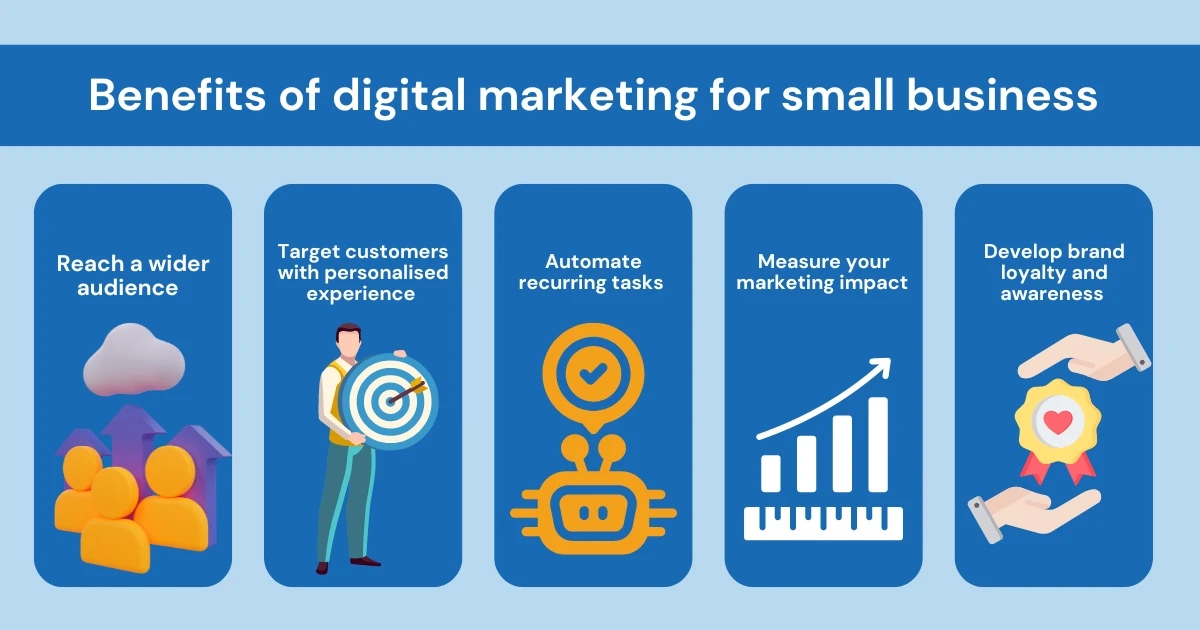
The internet is indispensable as almost any consumer is available online making a decision. The biggest fallacy small business owners are facing is not engaging with customers digitally. In an Ad Week article report, BCG senior partner John Rose suggested that businesses with fewer than 100 employees are focused more on getting customers than thinking about long-term advertising initiatives.
The benefits of digital marketing for small business narrows down to cost-effective strategies, brand visibility, targeted audience engagement, measurable results, and enhanced customer relationships. They can compete effectively in the digital landscape and achieve their growth goals by utilising digital marketing.
Reach a wider audience
Your business will reach a large audience while gaining new prospects for your brand. You can promote your business reaching potential customers through engaging content on social media channels used by your target audience. A SEO strategy will guide your business to become more visible on search engine result pages (SERP).
Target customers with personalised experience
When you know your target audience for your business, you need to prepare content that will be helpful to your target audience. You need to do connect with your target audience and give them a personalised marketing experience. You will gain a business opportunity with your consumers and remind them of the products and services they were interested in earlier.
Automate recurring tasks
Digital marketing solutions can automate your recurring tasks to ensure that there is a potential reduction in errors. Also, your employees can spend the time saved by focusing on tasks critical to your business. Consistency will be key in spending time to building the business’s long-term goals.
Measure your marketing impact
Digital marketing removes the need for guesswork in your marketing campaign. You can collect vital metrics automatically and use them to create visuals that give performance instantly. Email marketing helps you with this type of information. Gradually, you can learn which type of marketing activities can bring in the highest return-on-investment and better your marketing.
Build brand loyalty and awareness
Building brand recognition helps you compete with larger market players. Consistent branding will help you gain credibility in the industry. Your small business needs to utilise digital marketing strategies to sustain your business for a longer period of time. Building lasting relationships with your potential prospects to increase traffic to your website, increase brand awareness and customer loyalty.
Making Most of the Digital Marketing Strategies for Small Businesses
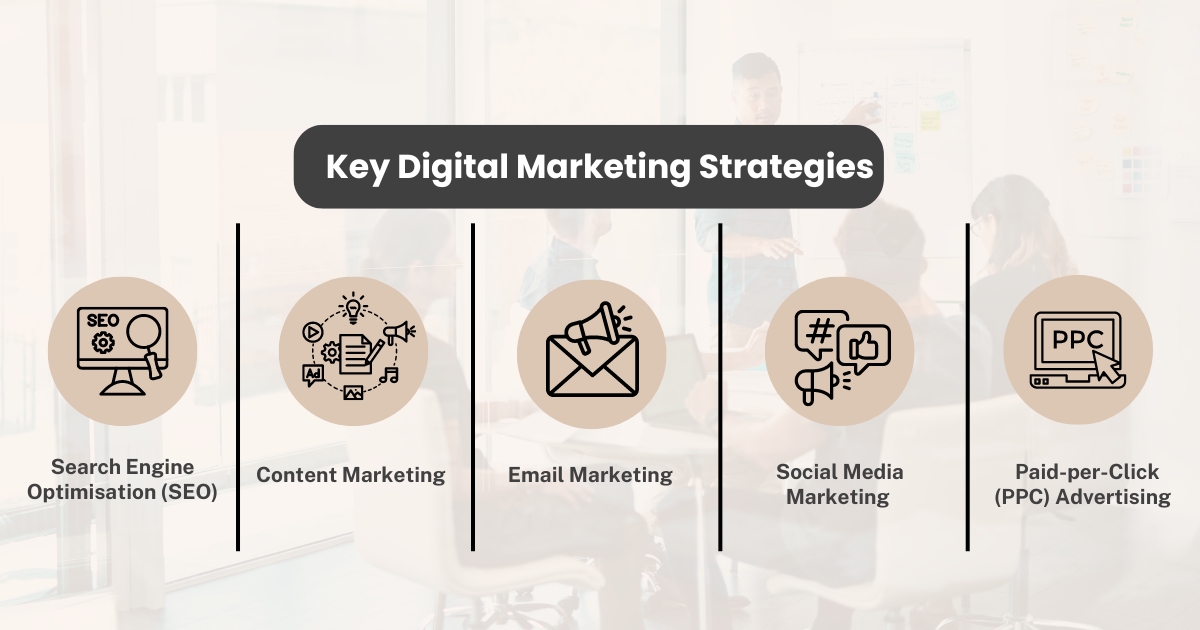
Small businesses have unprecedented opportunities to reach and engage with their target groups. But this is not possible without a clear and properly structured strategy. Digital marketing strategy for small business is essential to create successful business strategy that enables you to compete with larger companies.
We will look at a few key digital marketing strategies for small business:
Search Engine Optimisation (SEO)
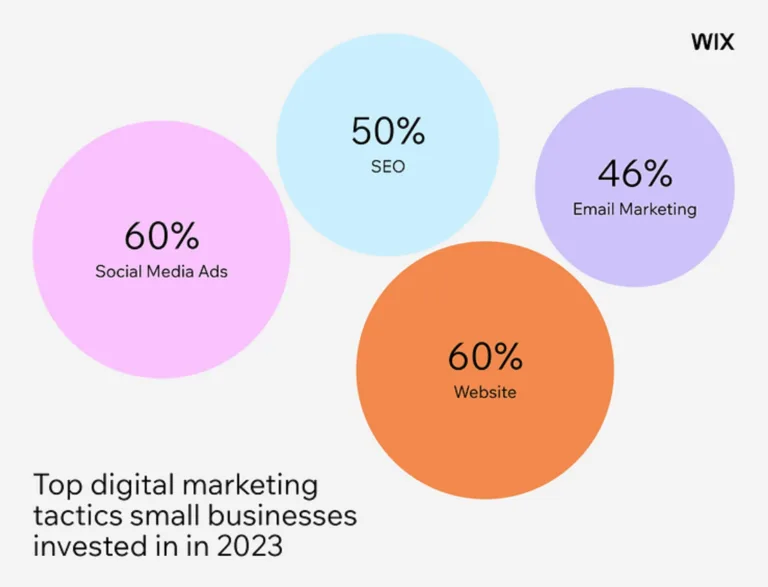
This strategy is a vital component in enhancing a website to improve its visibility on search engines through keywords and phrases. The visibility helps website traffic growth and builds brand awareness and credibility to attract potential customers.
Small businesses can improve their SEO by
- performing keyword research,
- creating content that resonates with your audience’s search intent
- ensuring your on-page SEO is on-point.
- identifying and solving technical SEO issues
- getting appropriate backlinks
- adding schema markup (HTML code for your website)
- optimising your website for customers
- setting up and optimising your Google Business profile
Content Marketing
73% of B2B marketers create and distribute relevant, valuable and consistent content to attract and retain your target audience. This strategy helps to build rapport and trust with your audience. For small businesses, this process can be a cost-effective way to draw in prospective customers steadily.
Opportunities your small business needs, to create engaging content that your target audience wants to consume is endless. 92% of businesses report that content is valuable for business. So, diversify your content with relevant keyword research to boost your content. Always work on repurposing content and monitor your content metrics to expand your reach and increase the quality of leads.
Social Media Marketing
Every individual uses some form of social media to communicate with their audience. It helps in brand building, sales growth, directing traffic to your website. Social media platforms give you a great opportunity to understand your audience and engage with them. But only 36% of small businesses see social marketing as a priority. This notion needs to change.

- Facebook – can help small businesses to build a strong online presence and nurture leads. This is the leading platform with 1 in 4 Australians spending an average of 20+ hours per month.
- X – offers the opportunity for direct audience interaction, and foster customer satisfaction and loyalty.
- Instagram – uses targeted marketing strategies to reach potential customers based on their interest and demographic. With an average use time of 11+ hours, Instagram’s potential ad reach is the largest among social media apps with an increase in 20% every year.
- TikTok – is known for its short, engaging video content. It gives opportunities to businesses to expand their reach.
- YouTube – reaches a wider audience and drives traffic to your website or landing page.

Image Courtesy – wearesocial.com - LinkedIn – allows businesses to establish their brand presence, connect with other businesses and engage with prospective clients and customers.
A social media marketing strategy needs to include SMART goals, define your audience and choose the right platform. Also do a competitor analysis, create and share your content and measure your results. Then review, revise and optimise to achieve best results.
Email Marketing
This is a powerful tool to grow your audience and boost your sales as 99% of users check their email every day. It involves sending personalised mails to prospective and existing customers to maintain a connection, nurture leads and drive conversions. Customised emails result in a 14% increase in click-through-rates and a 10% boost in conversions.
This process is cost-effective and offers high return on investment, providing valuable insights to refine your marketing efforts.
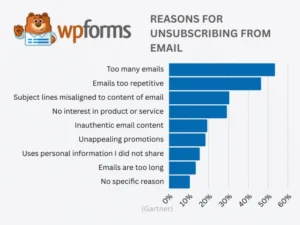
Tips to build an email list:
- Use embedded signup forms
- Deploy pop-ups and overlays
- Introduce gamification
- Create squeeze/landing pages
- Invite to sign up for notifications
- Host webinars and events
- Run contests and giveaways
- Collaborate with others
Effective email campaign step-by-step guide:
- Build a targeted email list
- Know your goals
- Understand your campaign
- Know your audience
- Use technology wisely
- Plan emails and followups
- Craft your subject line
- Write your copy
- Focus on email marketing design
- Test and track your email
Paid-per-Click (PPC) Advertising
This is an online advertising model where advertisers pay each time a user clicks on one of their online ads. PPC reaches a wider audience quickly based on keywords, location, demographics ensuring the ads are seen by the right people at the right time.
Small businesses can leverage PPC by creating the ideal audience personas, performing competitor research and keyword research. 65% of small- to medium-sized businesses (SMBs) run PPC campaigns. Small businesses invest 7x more in PPC than on SEO. It is notable that Facebook Ads and Google Ads generate highest ROI for businesses.
Google ads has opened the way for small businesses to convert a broader audience into loyal customers. It has precision targeting capabilities with flexible budgeting with real-time performance analysis, greater control over ad display and improved organic visibility.
Facebooks ads deliver value by connecting businesses with customers. When you advertise with Facebook, you can display your ads beyond Facebook’s news feed. These ads can reach the audience when they’re on Facebook, on an app or a different website.
LinkedIn ads allow businesses to place ads on their platform to target specific audiences through sponsored content, InMail, jobs and display ads. With B2B targeted ads, LinkedIn allows advertisers to retarget their ads to the audience who have interacted with their content.
All these ads can be started with a small budget. Focus on target keywords with clear ad copy. Incorporate a call to action, with a location. PPC ads optimised for mobile are 5x more effective. You need to review your results and use the ad for retargeting.
Measuring Success
72% of companies do not look at their ad campaigns for over a month. Without measuring and monitoring your ads, your ad budget is flushed away. Key performance indicators help you track and monitor your marketing campaigns performance success.
Some key metrics to track in digital marketing are:
- Traffic by source
- Returning visitors
- Average session duration
- Exit rate
- Bounce rate
- Conversion rate
- Sales metrics
- Leads quality and quantity
- Customer lifetime value
- Content marketing ROI
Some tools that can help you measure digital marketing success are:
Cyfe – monitors relevant statistics of your digital enterprise, and tracks sales, traffic, consumer trends.
Klipfolio – presents your site’s data in a readable format. It combines data from a variety of sources.
HotJar – monitors the frequency of clicks on various pages of your website.
Megalytic – simplifies analytic reports and provides insights.
SEMrush – monitors important metrics to help you understand your data
Kissmetrics – gets more customers by measuring the effectiveness of your product.
Moz Pro – is a SEO and content performance tool critical to your site’s traffic, readability and success.
Future Patterns for Digital Marketing
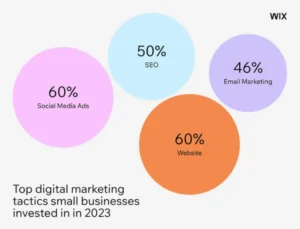
Around 78% of small businesses plan to spend their budget with more focus on marketing. They are strategising to experiment with trending methods to gain optimum results.
AI has transformed the marketing world permeating into every industry. Through AI, we are able to automate time-consuming tasks and increasing the productivity. AI is an invaluable asset that can help many small business owners to scale up their business.
Shachaf Rodberg, Wix’s marketing trend analyst tells, “AI is teaching us that humans don’t have to do everything…the people that are really good at their jobs, who are very creative or who have the most unique takes-will be able to scale themselves.”
Priority1 Marketing’s Role to grow Brisbane’s Small businesses
Priority1 Marketing is a leading digital marketing agency in Australia providing diverse digital marketing support customised for small businesses. We have an expert team specialising in SEO, social media marketing, and PPC to help small businesses enhance their presence online to draw more customers. Our services can guide small businesses to effectively target their audience, grow website traffic and conversions. We are your strategic digital marketing partner to help you gain the competitive edge you need to grow your small business. You will achieve long-lasting success in the digital landscape with ease.
Conclusion
Digital marketing offers unprecedented opportunities for small businesses to amplify their reach and engage with their target audience. In this blog, we have covered essential aspects like the challenges small businesses face and the need for digital marketing. We can understand how strategies like SEO, content marketing, social media marketing, email marketing and PPC advertising can increase your brand visibility and presence, grow and drive your traffic, generate leads, and better your relationship with the customers. Further, we learnt that AI has permeated into every industry and made labouring tasks easy with automation. With the help of all these strategies, small businesses in Australia can scale up their growth. We also need strategic marketing partners who can guide small businesses consistently. Priority1 Marketing can help your small business compete with larger enterprises through digital marketing. You can begin by implementing these crucial tactics to amplify the growth of your business and ensure sustainability.

